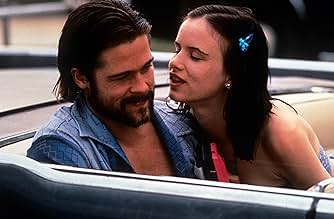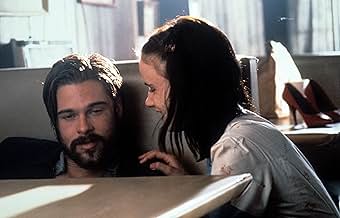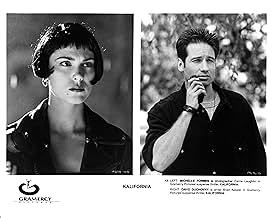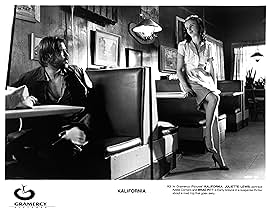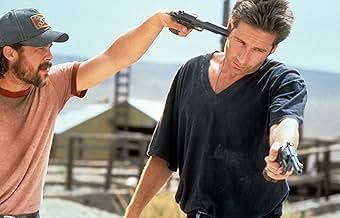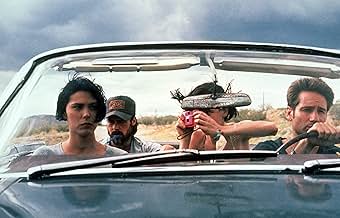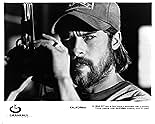Uma dupla de jornalistas percorre sites de assassinos em série com dois colegas, sem saber que um deles é um assassino em série.Uma dupla de jornalistas percorre sites de assassinos em série com dois colegas, sem saber que um deles é um assassino em série.Uma dupla de jornalistas percorre sites de assassinos em série com dois colegas, sem saber que um deles é um assassino em série.
- Prêmios
- 4 vitórias e 4 indicações no total
Kathy Larson
- Teenage Girl
- (as Catherine Larson)
James Michael McDougal
- John Diebold
- (as J. Michael McDougal)
Bill Crabb
- Middle-Aged Farmer
- (as Bill Crabbe)
Avaliações em destaque
Brian Kessler (David Duchovny) writes true crime stories. His girlfriend Carrie Laughlin (Michelle Forbes) is an edgy photographer. They consider themselves liberals and decide to drive cross-country visiting crime sites. Sharing the ride to California are criminal type Early Grayce (Brad Pitt) on parole, and his waitress girlfriend Adele (Juliette Lewis).
Juliette Lewis is playing her traditional flaky white trash girl. David Duchovny and Michelle Forbes are playing straight characters. Brad Pitt plays the more volatile unstable Early. It's Pitt's performance that stands out. It's his best early work. Lewis' innate innocence actually raises the tension. Everybody does good work here. It's a tense suspenseful thriller that we know will come to no good.
Juliette Lewis is playing her traditional flaky white trash girl. David Duchovny and Michelle Forbes are playing straight characters. Brad Pitt plays the more volatile unstable Early. It's Pitt's performance that stands out. It's his best early work. Lewis' innate innocence actually raises the tension. Everybody does good work here. It's a tense suspenseful thriller that we know will come to no good.
It's a road movie, with a killer on-board. Brian Kessler (David Duchovny), a sophisticated, urbane writer, wants to conduct field research on American serial killers. But, neither he, nor his girlfriend, Carrie (Michelle Forbes), has the money for a cross-country tour of murder sites, so they advertise for someone to share travel expenses. Who they end up with is a young couple, Early Grayce (Brad Pitt) and his girlfriend, Adele (Juliette Lewis), two better examples of "poor white trash" you will never find in all of cinema.
Indeed, Early and Adele are what make this film so entertaining, as they babble, cackle, confide, muse, speculate, drool, and otherwise behave in ways I haven't seen since reruns of "The Beverly Hillbillies". Early's idea of California: "People think faster out there, on account of all that warm weather; cold weather makes people stupid". That's enough to convince Adele: "I guess that explains why there are so many stupid people around here". To which Early responds proudly: "It sure does". Early continues to instruct Adele about California: "You never have to buy no fruit, on account it's all on the trees ... and they ain't got no speed limits, and I hear your first month's rent is free, state law".
But poor Early has some, well, mental problems, which become ever more obvious to Brian and Carrie as the four travelers proceed west across the U.S. As they enter the desert Southwest, with its beautifully stark landscape, "Kalifornia" starts to look more and more like "The Hitcher" (1986), and Early starts to act more and more like John Ryder, everyone's maniacal hitchhiker, whose terror seemed so unstoppable.
In "Kalifornia", the acting is uneven. Duchovny's performance is flat. Brad Pitt is surprisingly effective, despite his overacting at times. Michelle Forbes is great as the avant-garde, photographic artist. But my choice for best performance goes to Juliette Lewis. With her nasal voice and heavy-duty Southern accent, she is stunning, as the naive, highly animated, child-like Adele.
Toward the end, the film takes on a Twilight Zone feel to it, as our travelers enter a Nevada nuclear test site with a dilapidated old house full of test mannequins. The plot dissolves rather messily into unnecessary and preposterous violence, an ending that was somewhat disappointing.
Overall, however, "Kalifornia" is an entertaining film, thanks to a clever concept, great scenery, especially in the second half, good cinematography, great dialogue, and that wonderful performance by Juliette Lewis.
Indeed, Early and Adele are what make this film so entertaining, as they babble, cackle, confide, muse, speculate, drool, and otherwise behave in ways I haven't seen since reruns of "The Beverly Hillbillies". Early's idea of California: "People think faster out there, on account of all that warm weather; cold weather makes people stupid". That's enough to convince Adele: "I guess that explains why there are so many stupid people around here". To which Early responds proudly: "It sure does". Early continues to instruct Adele about California: "You never have to buy no fruit, on account it's all on the trees ... and they ain't got no speed limits, and I hear your first month's rent is free, state law".
But poor Early has some, well, mental problems, which become ever more obvious to Brian and Carrie as the four travelers proceed west across the U.S. As they enter the desert Southwest, with its beautifully stark landscape, "Kalifornia" starts to look more and more like "The Hitcher" (1986), and Early starts to act more and more like John Ryder, everyone's maniacal hitchhiker, whose terror seemed so unstoppable.
In "Kalifornia", the acting is uneven. Duchovny's performance is flat. Brad Pitt is surprisingly effective, despite his overacting at times. Michelle Forbes is great as the avant-garde, photographic artist. But my choice for best performance goes to Juliette Lewis. With her nasal voice and heavy-duty Southern accent, she is stunning, as the naive, highly animated, child-like Adele.
Toward the end, the film takes on a Twilight Zone feel to it, as our travelers enter a Nevada nuclear test site with a dilapidated old house full of test mannequins. The plot dissolves rather messily into unnecessary and preposterous violence, an ending that was somewhat disappointing.
Overall, however, "Kalifornia" is an entertaining film, thanks to a clever concept, great scenery, especially in the second half, good cinematography, great dialogue, and that wonderful performance by Juliette Lewis.
It's more than twenty years since I last saw this and I didn't really remember anything. Not even how violent it was, not even that it had a serial killer theme. I just remembered that it was a film to watch again some time because it was great. And so it is. Clearly not for everyone, this is one hell of a violent road movie with Brad Pitt in crashing, cruelly uncaring and at time even incoherently hateful and his little lady by his side, Juliette Lewis. We have seen her do her Southern, waif like kiddie stuff before but here she is allowed to go full throttle and so we have the most disturbing couple. Wild and horrific Brad and 'he only whips me if I deserve it' Juliette. Not an easy ride then but David Duchovny seems not too put out, certainly at first. He's already started up the Red Shoes Diary machine, about to become a real star through X-Files and Brad Pitt freaking out isn't going to ruffle his feathers, well at first anyway. Possibly a tad long, some have criticised the prolonged and crunchingly violent ending but if you fancy an off the wall road movie featuring one of Brad Pitt's best performances plus Juliette Lewis doing what she does best and then some, you can't do better than watch this mini classic
Nicely done! (pardon my Arnold Schwarzenegger)...
This movie was completely ignored when released back in '93, and that's a shame. It's a great, suspenseful two hour road-trip that certainly opened my eyes to see that Brad Pitt was indeed an actor. He looks like he took took the 'method-acting' thing seriously, as with his appearance in TRUE ROMANCE, I doubt he took even one shower in 1992.
Duchovny & Forbes were also fine as the normal half of this "ride share from hell", but I'm guessing Juliette Lewis' naive "jailbait" turned off a few people (see NBK or CAPE FEAR for further proof). Just ignore her grating & whiny delivery, and go along for the wild ride all the way to KALIFORNIA.
This movie was completely ignored when released back in '93, and that's a shame. It's a great, suspenseful two hour road-trip that certainly opened my eyes to see that Brad Pitt was indeed an actor. He looks like he took took the 'method-acting' thing seriously, as with his appearance in TRUE ROMANCE, I doubt he took even one shower in 1992.
Duchovny & Forbes were also fine as the normal half of this "ride share from hell", but I'm guessing Juliette Lewis' naive "jailbait" turned off a few people (see NBK or CAPE FEAR for further proof). Just ignore her grating & whiny delivery, and go along for the wild ride all the way to KALIFORNIA.
In the same vein as Natural Born Killers, another movie that was not so popular with critics because of its excessive violence but that I also loved, Kalifornia is a movie that clearly glamorizes violence, but I like to think that it turns that around in the final act. Kind of like how The Basketball Diaries glamorizes drugs at first, but shows the bad side by the end of the movie, which is far worse than the good side is good. David Duchovny plays Brian Kessler, an artistic yuppie with an even more artistically yuppie girlfriend, who is into that violent sexy black and white photography generally reserved for, I don't know where, places where nudity passes for art. Maybe it really does and I just don't understand it. At any rate, Brian and Carrie (Duchovny and Michelle Forbes, who fits the role flawlessly), make the perfect couple to go on a documentary tour of famous murder sites. Brian, the writer, will write the book, Carrie can take the pictures.
Being artistic types, Brian and Carrie are not quite financially prepared for such a trip, so they put out an ad for someone to share gas and travel expenses, and are contacted by Early Grace and Adele Corners (Brad Pitt and Juliette Lewis). Early is on parole and assigned to janitorial work at the local university by his parole officer, sees the ad on a bulletin board, and decides to leave the state for a while, violating his parole but also leaving the scene of his landlord's murder so he won't have to deal with a pesky murder investigation. Two birds with one stone, you know.
The movie has a curious ability to portray two stereotypes, the artsy yuppies and the greasy trailer trash, without resorting to clichés or even ending up with caricatures of either type. Brian and Carrie are artsy liberals, but while Carrie catches on to Early and Adele, Brian is fascinated with Early's status as an outlaw, as seen in the scene where Brian shoots Early's gun. Never having fired a gun before, he's as fascinated as a little kid. While Adele and Carrie are back at a hotel and Adele reveals such things in her childlike way as the fact that Early "broke her" of smoking and that she's not allowed to drink (Early doesn't think women should), Early and Brian are out at the local bar. Brian reacts nervously to a drunk trying to start a fight with him, and Early first gives advice to Brian on what to do and then steps in and dishes out a quick lesson for the guy. "Hit him, Bri, it's comin'." This is one of my favorite scenes in the movie, partly because it's so funny what Early gleefully says as the guy's friends drag him away, bloodied and battered, but also because as it is intercut with the girls back at the hotel, we learn so much all at once about the two couples, their differences, and the conflicts that are likely to come up because of them. And besides that, because Brian benefited from Early's actions and Carrie is appalled by what she hears from Adele, it also illustrates the different way that Carrie and Brian react to Early and Adele.
Clearly, by now, you can tell that this is not your typical odd couple type of thriller, where the city folk run into the country folk and all sorts of stereotypical mayhem ensues. On one hand it seems a little too convenient that Brian and Carrie go on a tour of murder sites and just happen to be accompanied by a real life murderer, but on the other hand it's a great way to counteract the glorifying of murder that is inherent within a cross-country trip designed to bring fame to murderers and their crimes. While studying the actions of past murderers, Brian and Carrie ultimately find themselves face to face with the very material that they are studying, and realize that murder is not as pretty or morbidly fascinating when it's in your face as it is through disconnected studies of murders past.
I am constantly amazed at Brad Pitt's versatility as an actor. Consider, for example, his roles in movies like Kalifornia, 12 Monkeys, Fight Club, and Ocean's 11 and 12. Pitt is like Tom Hanks in that he can change his appearance drastically or just enough to fit a given character, and is completely believable. Incidentally, I tried in vain to be Early Grace for Halloween this year, but just couldn't get the hair and beard right. I even got the hat right, which initially I thought would be the hardest part.
It's easy to understand why a lot of people disliked Kalifornia or why they think that it glorifies violence and murder, but I think that whatever glorifying it does is done with the intention of clarifying the audience's understanding of its subject matter. A film that didn't glorify violence, at least initially, could never be as effective as Kalifornia, but the movie structures it perfectly. The glorification is all embodied in Brian's and Carrie's fascination with the idea of murder and the auras of the places in which is happened, but their realization, and ours, is embodied in the real thing, which they encounter with Early and Adele. The movie's very purpose is to describe that difference between idealizing violence and seeing the horror of it up close and for real.
Being artistic types, Brian and Carrie are not quite financially prepared for such a trip, so they put out an ad for someone to share gas and travel expenses, and are contacted by Early Grace and Adele Corners (Brad Pitt and Juliette Lewis). Early is on parole and assigned to janitorial work at the local university by his parole officer, sees the ad on a bulletin board, and decides to leave the state for a while, violating his parole but also leaving the scene of his landlord's murder so he won't have to deal with a pesky murder investigation. Two birds with one stone, you know.
The movie has a curious ability to portray two stereotypes, the artsy yuppies and the greasy trailer trash, without resorting to clichés or even ending up with caricatures of either type. Brian and Carrie are artsy liberals, but while Carrie catches on to Early and Adele, Brian is fascinated with Early's status as an outlaw, as seen in the scene where Brian shoots Early's gun. Never having fired a gun before, he's as fascinated as a little kid. While Adele and Carrie are back at a hotel and Adele reveals such things in her childlike way as the fact that Early "broke her" of smoking and that she's not allowed to drink (Early doesn't think women should), Early and Brian are out at the local bar. Brian reacts nervously to a drunk trying to start a fight with him, and Early first gives advice to Brian on what to do and then steps in and dishes out a quick lesson for the guy. "Hit him, Bri, it's comin'." This is one of my favorite scenes in the movie, partly because it's so funny what Early gleefully says as the guy's friends drag him away, bloodied and battered, but also because as it is intercut with the girls back at the hotel, we learn so much all at once about the two couples, their differences, and the conflicts that are likely to come up because of them. And besides that, because Brian benefited from Early's actions and Carrie is appalled by what she hears from Adele, it also illustrates the different way that Carrie and Brian react to Early and Adele.
Clearly, by now, you can tell that this is not your typical odd couple type of thriller, where the city folk run into the country folk and all sorts of stereotypical mayhem ensues. On one hand it seems a little too convenient that Brian and Carrie go on a tour of murder sites and just happen to be accompanied by a real life murderer, but on the other hand it's a great way to counteract the glorifying of murder that is inherent within a cross-country trip designed to bring fame to murderers and their crimes. While studying the actions of past murderers, Brian and Carrie ultimately find themselves face to face with the very material that they are studying, and realize that murder is not as pretty or morbidly fascinating when it's in your face as it is through disconnected studies of murders past.
I am constantly amazed at Brad Pitt's versatility as an actor. Consider, for example, his roles in movies like Kalifornia, 12 Monkeys, Fight Club, and Ocean's 11 and 12. Pitt is like Tom Hanks in that he can change his appearance drastically or just enough to fit a given character, and is completely believable. Incidentally, I tried in vain to be Early Grace for Halloween this year, but just couldn't get the hair and beard right. I even got the hat right, which initially I thought would be the hardest part.
It's easy to understand why a lot of people disliked Kalifornia or why they think that it glorifies violence and murder, but I think that whatever glorifying it does is done with the intention of clarifying the audience's understanding of its subject matter. A film that didn't glorify violence, at least initially, could never be as effective as Kalifornia, but the movie structures it perfectly. The glorification is all embodied in Brian's and Carrie's fascination with the idea of murder and the auras of the places in which is happened, but their realization, and ours, is embodied in the real thing, which they encounter with Early and Adele. The movie's very purpose is to describe that difference between idealizing violence and seeing the horror of it up close and for real.
Você sabia?
- CuriosidadesDuring the movie, Early Grayce sports a chipped tooth. Brad Pitt visited a dentist to have the tooth chipped for the role.
- Erros de gravaçãoTowards the end of the movie, Early violently smacks his gun across Brian's temple, above his left eye. His temple is shown in a subsequent shot as very bloody, yet there is no visible injury (or bandage) in that spot a short time later as Brian is shown driving down the road chasing after Early & Carrie.
- Citações
Brian Kessler: When you dream there are no rules. People can fly. Anything can happen. Sometimes there's a moment as you're waking and you become aware of the real world around you, but you are still dreaming. You may think you can fly but you better not try.
- Versões alternativasEuropean release and US video/Laserdisc Unrated versions feature about one minute of additional violent footage not present in US theatrical R-rated version. Unrated version of sex scene between Brian and Carrie is slightly longer and more explicit than the R rated version.
- Trilhas sonorasLook Up to the Sky
Written by Angelique Bianca
Performed by The Indians
Courtesy of Polydor Records
By Arrangement with PolyGram Special Markets
Principais escolhas
Faça login para avaliar e ver a lista de recomendações personalizadas
Detalhes
- Data de lançamento
- País de origem
- Idioma
- Também conhecido como
- Kalifornia - Uma jornada no inferno
- Locações de filme
- Covington, Geórgia, EUA(Motel exteriors)
- Empresas de produção
- Consulte mais créditos da empresa na IMDbPro
Bilheteria
- Orçamento
- US$ 9.000.000 (estimativa)
- Faturamento bruto nos EUA e Canadá
- US$ 2.395.231
- Fim de semana de estreia nos EUA e Canadá
- US$ 1.159.133
- 6 de set. de 1993
- Faturamento bruto mundial
- US$ 2.395.231
- Tempo de duração1 hora 57 minutos
- Cor
- Mixagem de som
- Proporção
- 2.35 : 1
Contribua para esta página
Sugerir uma alteração ou adicionar conteúdo ausente

Principal brecha
By what name was Kalifornia: Uma Viagem ao Inferno (1993) officially released in India in Hindi?
Responda



